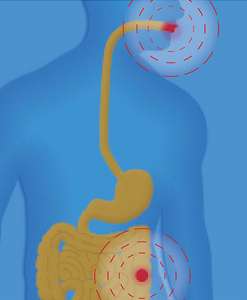Canker sores and the digestive tract

They are small and painful, and can turn your favorite lemon sorbet into a world of hurt. They are canker sores, and if you are one of the 20 percent of people who get them, you know that these noncontagious mouth ulcers can make eating, drinking and even talking a feat.
A number of things tend to trigger them, from trauma to the mouth (think of an accidental bite to the cheek or a toothbrush jab) to a diet lacking in certain vitamins and minerals. But surprisingly, we don't really know why they develop.
At least one researcher is looking beyond the mouth for answers. Joel Weinstock, a professor at Tufts School of Medicine and chief of the gastroenterology/hepatology division at Tufts Medical Center, is conducting a study that will look at the colons of people who get canker sores to see whether they have similar lesions in their intestinal lining.
While the connection may not seem obvious, canker sores often show up in patients who have such illnesses as inflammatory bowel disease. People with Crohn's disease, for example, often develop canker sores during a flare-up of their gastrointestinal symptoms.
As with canker sores, the cause of Crohn's disease is unclear, but it is believed to be the result of the immune system overreacting to the organisms that live in the gut. "If you get a break in the epithelium [the layers of cells that line the intestine], you start reacting way beyond what you should," Weinstock says. "Maybe the same process is happening in the mouth." The mouth and intestine, after all, are really two distant parts of the digestive tract.
"The question is, then, is this common mouth ulcer that we see out there really more of a manifestation of the general tendency for the whole [digestive tract] to overreact?" he asks.
To find out, Weinstock is recruiting patients who develop canker sores at least a few times a year (but do not have any ongoing gastrointestinal issues) so he can look at their intestines. The participants get a free colonoscopy, conducted by Weinstock himself.
More information: Weinstock is asking for help from dentists, who are well-positioned to identify patients who get canker sores—also known as aphthous ulcers. Interested patients can contact Weinstock at Jweinstock2@tuftsmedicalcenter.org or 617-636-8387.
















